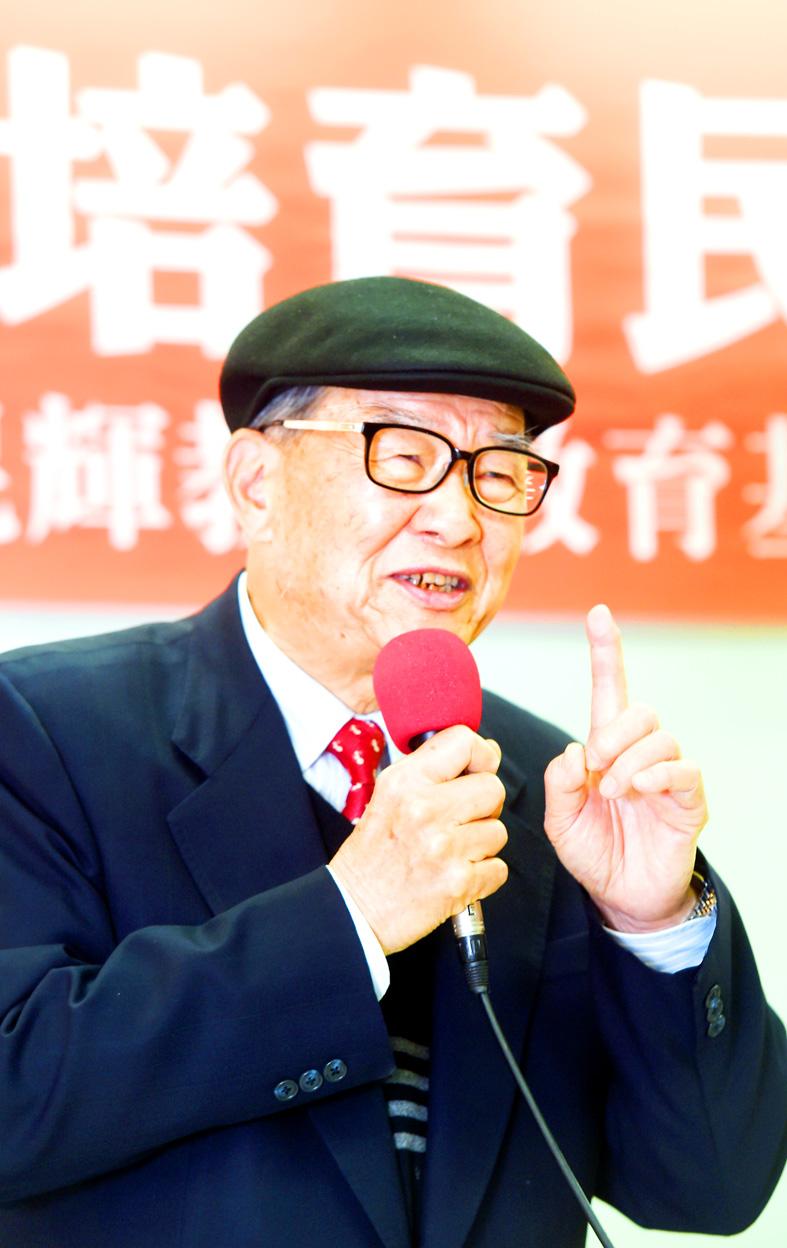In a survey released yesterday, 96.4 percent of respondents said it is important for future talent in the nation to be bilingual.
The survey by the Professor Huang Kun-huei Education Foundation showed that 97.8 percent of respondents said it was important for future talent to possess the ability to innovate, 95.7 percent said it was important for future talent to have digital skills and 97.7 percent said it was important for future talent to demonstrate civic literacy.
At a news conference in Taipei held to release the survey results, Lu Mu-lin (呂木琳), a professor at Ming Chuan University’s Graduate School of Education, said there is a high degree of public consensus on the need for future talent to be bilingual and innovative, and possess digital abilities and civic literacy.

Photo: Fang Pin-chao, Taipei Times
The inclusion of those skills and qualities in the 12-Year Basic Education Curriculum Guidelines shows that the Ministry of Education is aware of their importance, said Lu, who was deputy minister of education from 2006 to 2009.
He said it would be challenging to convert those goals into results and urged the ministry to contemplate how to design courses that would achieve them.
The Executive Yuan on Dec. 6, 2018, passed a “blueprint for developing a bilingual nation” submitted by the National Development Council, with the aim of achieving widespread English fluency by 2030.
The survey also showed that 80.6 percent of people agreed that the government should take measures to encourage exceptional international students in Taiwan to stay and work after graduating.
Of the respondents, 85.5 percent agreed that the ministry should relax regulations to give universities more flexibility to accept requests from the corporate sector to host the talent training courses it needs, the foundation said.
Of those interviewed, 90.3 percent agreed that to protect the nation’s information security, the government should allocate more resources and funding to training information security talent.
To respond to society’s rapid development, 93.4 percent of respondents agreed that the ministry should create and promote a range of convenient ways for people to engage in lifelong learning — such as providing opportunities to pursue further studies anywhere and at any time.
The survey found that 84.3 percent agreed that the ministry should partner with other government agencies to amend regulations to require companies to contribute financially toward the lifelong learning of their employees, and reward those that do so.
Foundation poll committee convener Kuo Sheng-yu (郭生玉) said that although the ministry has been promoting lifelong learning since 1998, and promulgated the Lifelong Learning Act (終身學習法) in 2002, its work in the area has been “disheartening.”
He recommended that the ministry appoint a group of experts to plan an “online learning database,” or to cooperate with local universities to offer online courses.
Lu said that institutions such as public libraries, performance venues, and science and cultural centers could serve as “learning centers” equipped with staff who could direct people to the educational resources they need online.
The foundation commissioned Taiwan Indicators Survey Research Co to carry out the survey by telephone from March 6 to 10.
The survey collected valid responses from 1,071 adults aged 20 or older, and has a margin of error of 3 percentage points, the foundation said.

MAKING WAVES: China’s maritime militia could become a nontraditional threat in war, clogging up shipping lanes to prevent US or Japanese intervention, a report said About 1,900 Chinese ships flying flags of convenience and fishing vessels that participated in China’s military exercises around Taiwan last month and in January have been listed for monitoring, Coast Guard Administration (CGA) Deputy Director-General Hsieh Ching-chin (謝慶欽) said yesterday. Following amendments to the Commercial Port Act (商港法) and the Law of Ships (船舶法) last month, the CGA can designate possible berthing areas or deny ports of call for vessels suspected of loitering around areas where undersea cables can be accessed, Oceans Affairs Council Minister Kuan Bi-ling (管碧玲) said. The list of suspected ships, originally 300, had risen to about 1,900 as

Japan’s strategic alliance with the US would collapse if Tokyo were to turn away from a conflict in Taiwan, Japanese Prime Minister Sanae Takaichi said yesterday, but distanced herself from previous comments that suggested a possible military response in such an event. Takaichi expressed her latest views on a nationally broadcast TV program late on Monday, where an opposition party leader criticized her for igniting tensions with China with the earlier remarks. Ties between Japan and China have sunk to the worst level in years after Takaichi said in November that a hypothetical Chinese attack on Taiwan could bring about a Japanese

Right-wing political scientist Laura Fernandez on Sunday won Costa Rica’s presidential election by a landslide, after promising to crack down on rising violence linked to the cocaine trade. Fernandez’s nearest rival, economist Alvaro Ramos, conceded defeat as results showed the ruling party far exceeding the threshold of 40 percent needed to avoid a runoff. With 94 percent of polling stations counted, the political heir of outgoing Costa Rican President Rodrigo Chaves had captured 48.3 percent of the vote compared with Ramos’ 33.4 percent, the Supreme Electoral Tribunal said. As soon as the first results were announced, members of Fernandez’s Sovereign People’s Party

MORE RESPONSIBILITY: Draftees would be expected to fight alongside professional soldiers, likely requiring the transformation of some training brigades into combat units The armed forces are to start incorporating new conscripts into combined arms brigades this year to enhance combat readiness, the Executive Yuan’s latest policy report said. The new policy would affect Taiwanese men entering the military for their compulsory service, which was extended to one year under reforms by then-president Tsai Ing-wen (蔡英文) in 2022. The conscripts would be trained to operate machine guns, uncrewed aerial vehicles, anti-tank guided missile launchers and Stinger air defense systems, the report said, adding that the basic training would be lengthened to eight weeks. After basic training, conscripts would be sorted into infantry battalions that would take